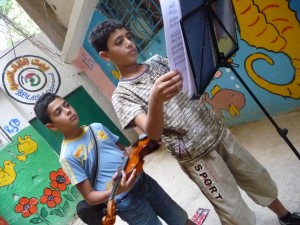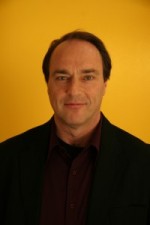
Abdallah Qazwah, 11, looks over sheet music to Beethoven's "Romance" in the Shatila refugee camp in Beirut. His brother, Khalil, a tabla player, stands at the ready with Abdallah's violin
“Romance!” exclaims 11-year-old Abdallah, standing astride his violin case in a narrow alley of Shatila, the Palestinian refugee camp in Lebanon. His eyes are alive, his smile wide. The exclamation comes in response to a question: What is your favorite music? The interviewer (that would be me) is not exactly a classical music aficionado, and so I had to wait for Abdallah’s violin teacher, the classically-trained Cambridge (UK) grad, Alice Howick, to tell me that the boy was not talking about a type of music, but rather an actual piece called Romance, by Beethoven.
Abdallah Qazwah is a student at Al Kamandjati, the Ramallah-based Palestinian classical and Arabic music school founded by Ramzi Aburedwan, who grew up in the Al-Amari refugee camp near Ramallah.
During the first intifada (1987-93), Ramzi was one of the “children of the stones” who fought to end the Israeli occupation. At age eight, he was hurling stones at Israeli soldiers. Later, he picked up a viola, got a scholarship, trained at a French conservatory, and built a vision to share the power of music to transform the lives of Palestinian children, especially in the refugee camps. Today dozens of musicians from across Europe, the U.S. and Palestine work with hundreds of Palestinian children in the West Bank and Lebanon.
Over the weekend I went with Ramzi from Ramallah to Beirut to check out Al Kamandjati’s work here. Like Ramzi, Abdallah was born decades after the first refugees arrived in 1948, having fled or been driven out of their homes during the creation of Israel. At Shatila, a few hundred refugees took what they thought would be temporary shelter in tent camps in Lebanon. Sixty-three years after their Nakba (Catastrophe), some 12 thousand refugees crowd into haphazard and ever-expanding concrete and rebar dwellings on a single kilometer of land in Beirut. They’re still waiting to go home.
Of course neither Abdallah nor his parents have any memory of the Nakba; neither does the child recall the unspeakable things that happened at Sabra and Shatila in 1982, or during the War of the Camps a few years later. And he has never laid eyes on Acca, once a Palestinian Mediterranean town and now part of Israel (known there as Akko, or Acre), halfway between Haifa and Shatila. But like so many children from the camps, he yearns to know the place he calls his home.
A few weeks ago, during a violin lesson, Alice, who directs the Al Kamandjati program in Lebanon, mentioned to Abdallah that she’d been to Acca. The boy calmly put his violin in its case, pulled up a couple of chairs, and, Alice recalled, “sat me down and said, ‘tell me everything about this place. I want to know it, I want to imagine it.’ So I tried to describe for him a little about this beautiful city. And he stopped me and said, ‘Fi hamam?’ And hammam is the word for a bathroom so I thought he was talking about a Turkish bath. And I told him, ‘Yes there are, I’ve never been but I’m sure it’s great.’ I thought it was a weird question. And he said, ‘No, not hammam, hamam.’ Which means doves. He wants to know if there’s doves in the city. I told him, ‘It’s two hours that way. Everything you have here…’ I mean, they feel so far away from this country somehow.”
The story of the Palestinian refugee camp is the story of the past – treasured memories of a village long gone, mixed with the trauma of expulsion – and the future: dreams of a moment when, somehow, the U.N. resolution promising the right of return will finally be implemented, and the refugees will be allowed to go home. Of course those old homes, in many cases, no longer exist. But the memory of them does. And for the refugees in Lebanon, living in the past and the future seems to make the present a little more tolerable.
Abdallah’s present now includes Romance. And so it is for all the children of Al Kamandjati, in Lebanon and the occupied West Bank. Music is the present; it lives in the moment at hand. In front of a music stand, before a wall of brightly painted sea creatures, Alice crouches beside her pupil, pointing to a measure and giving him some final tips. Abdallah nods. His bright eyes dance over a page of notes first written down by Ludwig van Beethoven two centuries ago. And he begins to play.

